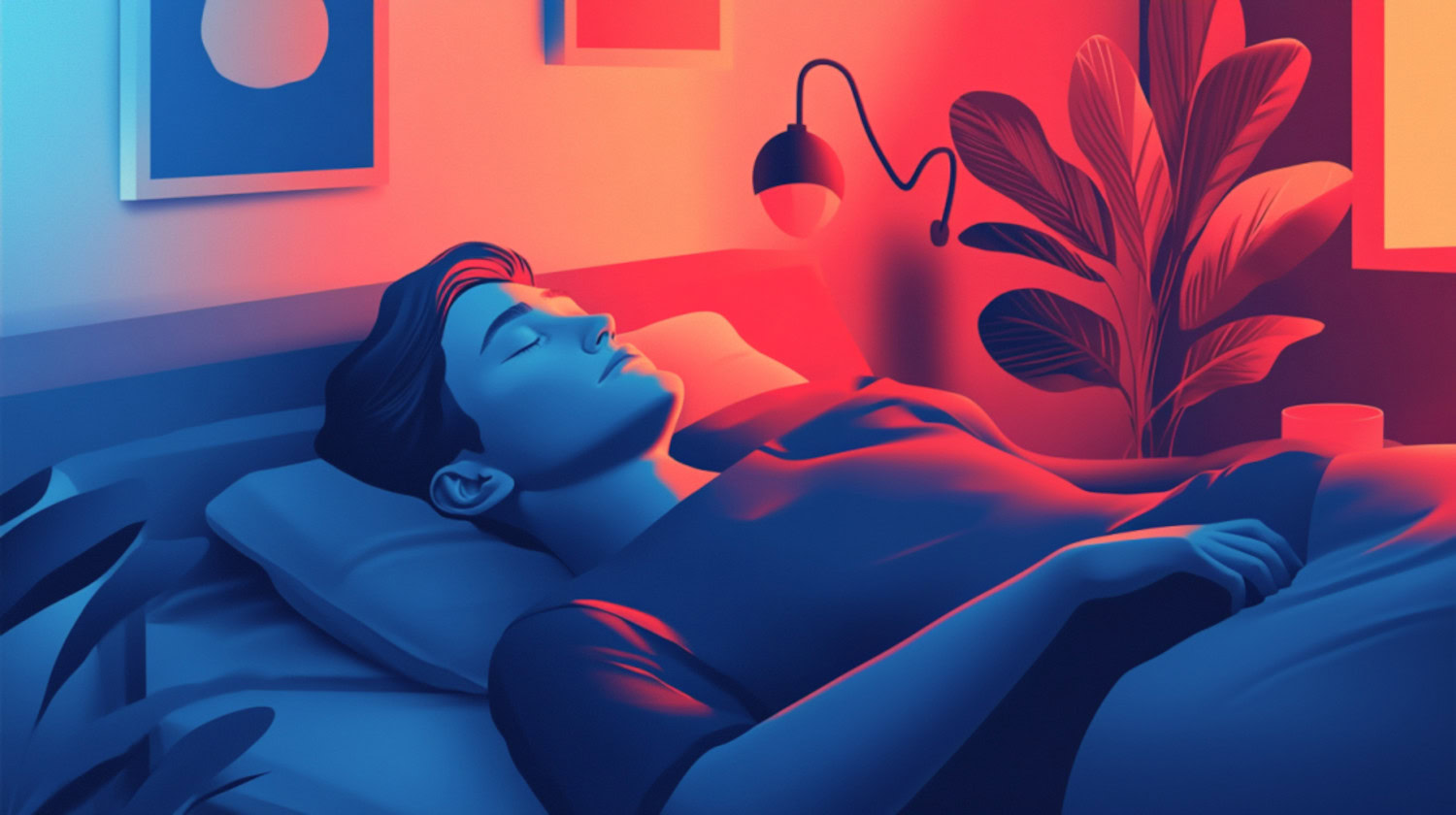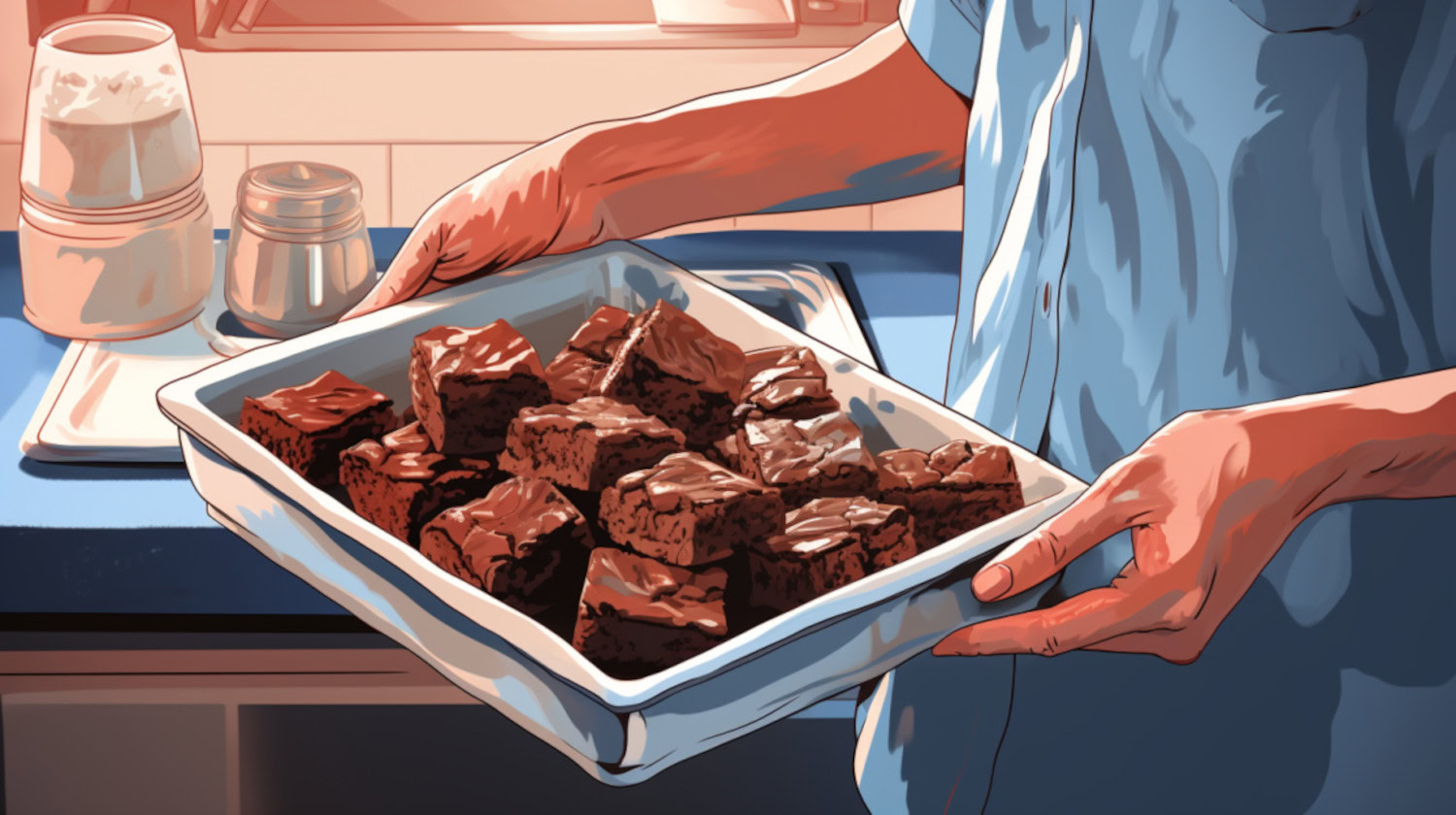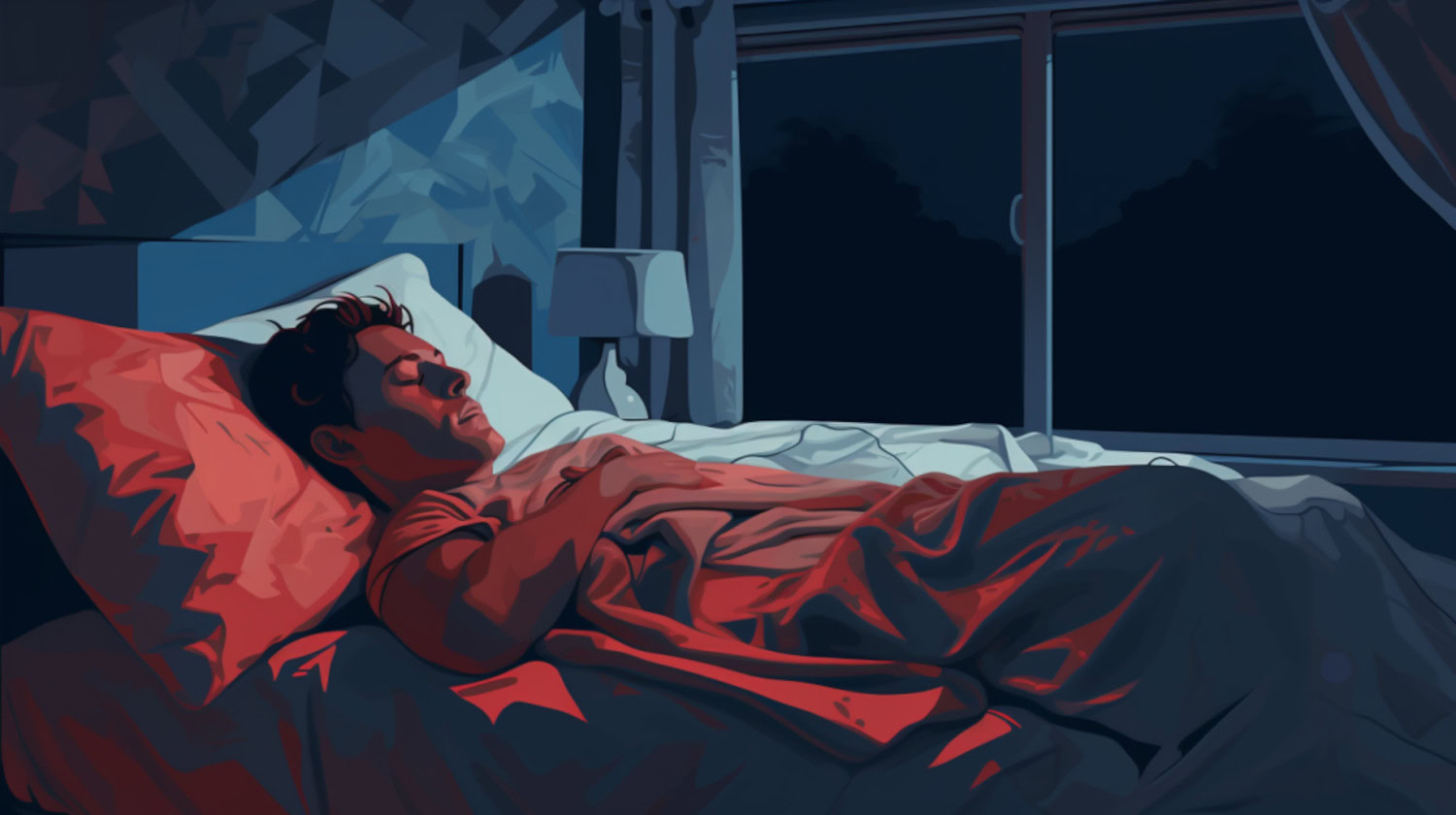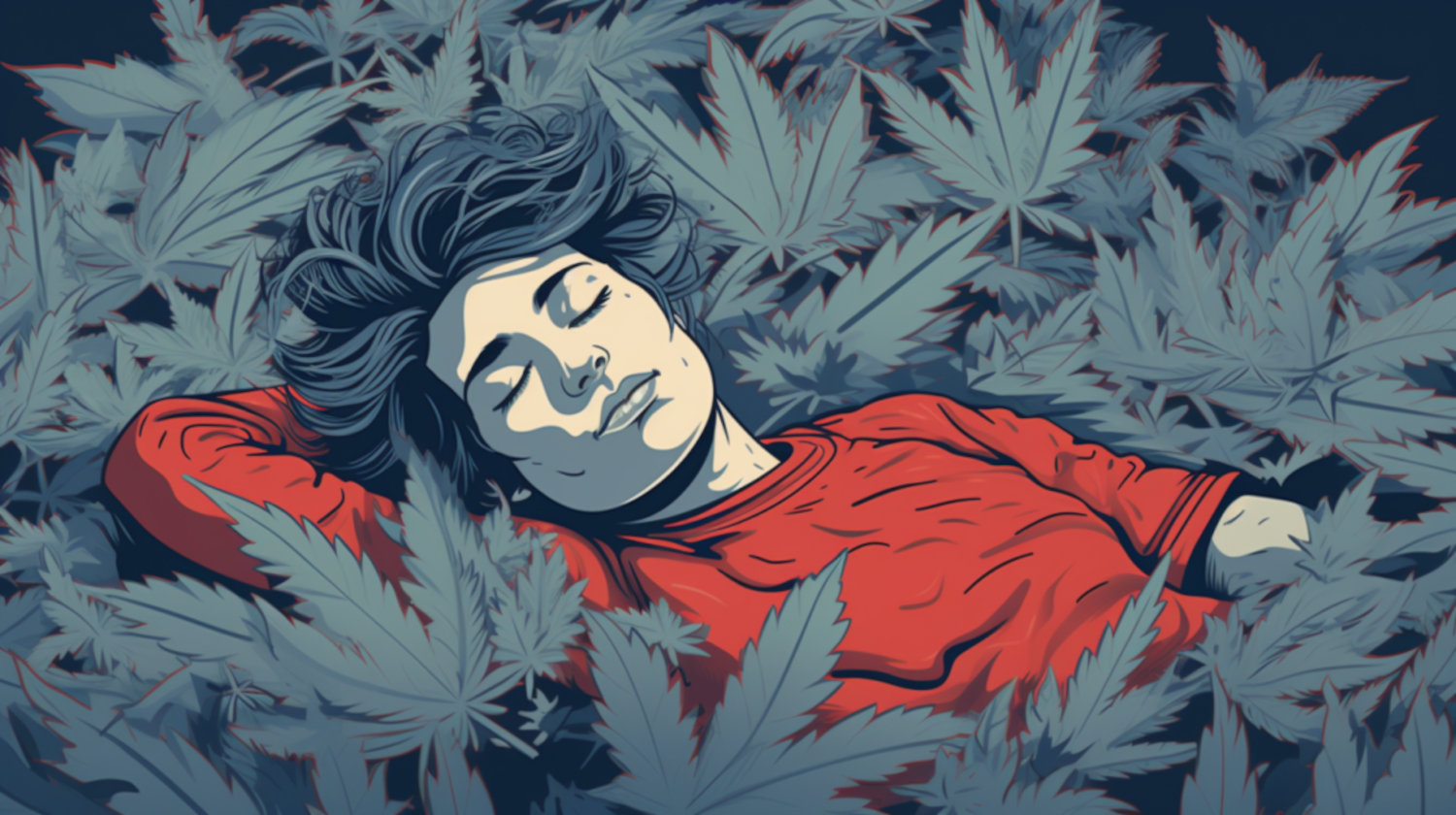In This Article
- "Being all-natural vs. pharmaceuticals makes a big difference to me. I don’t feel hungover vs. [with] sleeping meds."
- "I have a condition called Restless Leg Syndrome. Smoking calms me, so it helps with the kicking and jerking of my leg. I also have anxiety and sleep paralysis, so [it] helped a lot there, too."
- "[I] tried everything to sleep – THC gummies do the trick."
- "I used to take sleeping meds to sleep at night but had to quit because of getting trapped in nightmares and not waking. Then, after quitting the meds, I would wake up after nightmares and not be able to go back to sleep. Using medical cannabis after nightmares calms me down a lot faster, and most of the time, I am able to go back to sleep."
- "I used to rely on sleeping pills, and I did not want to continue with that. I tried melatonin, but it gave me nightmares. Now I sleep better."
- "I had crippling insomnia for months (2-3 hours of sleep a night). I was self-medicating with Benadryl or alcohol to try and sleep, which did not work. My family practitioner recommended medical marijuana. After starting it, I was able to fall asleep again if I woke up. It's made a huge difference in my life."
- "I never got any sleep before cannabis. I would be tired throughout the day due to lack of sleep. Especially at school/work, I felt drained, and [my] body would ache. When going out, my hands sweated, [my] stomach hurt, and [my] head had pressure. Now that I have cannabis in my life, it has put so much relief on me mentally and physically. All the things I used to feel simply go away with a puff or a gummy."
- "I have been prescribed an array of medications to help with my sleep, and none of them have worked. Cannabis seems to do the work, and there are no side effects that I have noted."
- "I used to be awake for up to 5 days at a time, but since trying marijuana, I've been getting good sleep."
- "[I] struggled to sleep for years; I was constantly waking up. I first tried gummies, but switched to smoking as I felt groggy from the edibles. When I found out I had arthritis in my elbow, I wanted to try something to help."
- Results May Vary
- References
Key Takeaways
- Numerous patient reports claim that cannabis improves sleep quality.
- Research suggests cannabis may offer a natural alternative for sleep-related issues like insomnia, RLS, anxiety, and nightmares.
- Finding the right product and consumption method is important, as each person’s needs and preferences vary.
People are increasingly turning to medical cannabis as a potential sleep aid–with many patients reporting positive experiences. A growing number of lab studies support some of these claims as well. But do the claims and growing research confirm that cannabis is a bonafide sleep aid?
"Being all-natural vs. pharmaceuticals makes a big difference to me. I don’t feel hungover vs. [with] sleeping meds."
It's a common sentiment shared across much of the cannabis community. People want to feel better without the unwanted side effects associated with traditional sleep medications.
Consumers cite concerns about side effects, dependency, and the "hungover" feeling associated with prescription sleep aids. Meanwhile, cannabis serves as a viable option for those seeking improved sleep without pharmaceuticals.
"I have a condition called Restless Leg Syndrome. Smoking calms me, so it helps with the kicking and jerking of my leg. I also have anxiety and sleep paralysis, so [it] helped a lot there, too."
Sometimes, people face several symptoms that affect their sleep simultaneously. Restless Leg Syndrome (RLS) is a neurological disorder that causes a person to feel a seemingly irresistible urge to move their legs. The sleep-disrupting condition is believed to be caused by anxiety. Further, this patient is one of many to suffer from sleep paralysis, which can significantly diminish sleep quality.
THC is known to reduce REM sleep, leading researchers to study if the cannabinoid could benefit sleep paralysis and other REM-sleep-state conditions, including narcolepsy and sleep-wake hallucinations.1 While additional research is needed to determine cannabis’ efficacy on such conditions, this person appears to be one of the numerous anecdotes suggesting it can help.
"[I] tried everything to sleep – THC gummies do the trick."

This quote highlights the importance of discovering the right product and consumption method for individual needs. Part of finding the perfect sleep option is identifying the strain, cannabinoids, dosage, and consumption method that works best for someone.
While it would be ideal to say all cannabis products affect consumers as intended, numerous internal and external factors affect how it may impact a consumer. For many, 10mg THC gummies, with their controlled dosage and gradual onset of effects, prove effective in managing sleep quality. Others may need a different dosage and/or consumption method to feel the effects how they desire and in the timeline they need for it to take effect.
"I used to take sleeping meds to sleep at night but had to quit because of getting trapped in nightmares and not waking. Then, after quitting the meds, I would wake up after nightmares and not be able to go back to sleep. Using medical cannabis after nightmares calms me down a lot faster, and most of the time, I am able to go back to sleep."
This patient's experience highlights the potential adverse effects of some prescription sleep medications and the potential benefits of cannabis as an alternative. Many traditional sleep options, such as benzodiazepines, have been linked to nightmares and sleep disturbances. On the other hand, studies into cannabis and sleep, including its impact on individuals with post-traumatic stress disorder (PTSD), noted some patients experienced reduced nightmares.2
"I used to rely on sleeping pills, and I did not want to continue with that. I tried melatonin, but it gave me nightmares. Now I sleep better."
Side effects and dependency are a regular concern for people using sleeping pills and similar options like melatonin. Though it is considered safe in most uses, melatonin has been known to create vivid dreams in some consumers.
Cannabis’ REM-reducing effects can be beneficial at times, with some reports reflecting this. While cannabis doesn’t appear to produce nightmares or side effects like pharmaceuticals, its impact on long-term sleep remains under analysis. As such, patients need to consult with trusted medical professionals before turning to any sleep option.
"I had crippling insomnia for months (2-3 hours of sleep a night). I was self-medicating with Benadryl or alcohol to try and sleep, which did not work. My family practitioner recommended medical marijuana. After starting it, I was able to fall asleep again if I woke up. It's made a huge difference in my life."

This quote highlights the potential of medical cannabis and the dangers of self-medicating with over-the-counter drugs and alcohol. Options like Benadryl and alcohol may provide temporary sedation. However, they are ineffective as long-term sleep aids and may cause detrimental results. The sentiment is particularly true with alcohol, which is not intended to be a sleep aid and has a detailed list of adverse long-term effects.
On the other hand, medical cannabis has shown promise in improving sleep, though additional research is needed to fully understand its effects on long- and short-term sleep.3 With insomnia being a serious condition, individuals should seek professional medical advice before using any option as a sleep aid.
"I never got any sleep before cannabis. I would be tired throughout the day due to lack of sleep. Especially at school/work, I felt drained, and [my] body would ache. When going out, my hands sweated, [my] stomach hurt, and [my] head had pressure. Now that I have cannabis in my life, it has put so much relief on me mentally and physically. All the things I used to feel simply go away with a puff or a gummy."
This patient's experience speaks to the wide-ranging benefits of cannabis for sleep and overall well-being. Lack of sleep can have significant physical and mental consequences, impacting daily life and overall quality of life.
Cannabis may help alleviate these issues. In doing so, the person may experience improved sleep, reduced stress, and elevated life quality. Research is still ongoing, as results tend to vary by patient.
"I have been prescribed an array of medications to help with my sleep, and none of them have worked. Cannabis seems to do the work, and there are no side effects that I have noted."
A lack of sleep can lead to numerous detrimental health outcomes, including fatigue, anxiety, and decreased cognitive functions.4 For some, standard medications and techniques don't seem to work. Unfortunately, cannabis prescriptions are not possible under current U.S. laws. However, those in legal medical cannabis states can receive similar recommendations for THC- and CBD remedies.
The patient quoted here is a testament to what medical cannabis proponents have been saying for years. With select studies indicating that THC and CBD both show promise, individuals may find relief in cannabis of some kind.5 Still, research into cannabis’ impact on long-term sleep is ongoing, which could reveal underlying side effects. Once again, this level of uncertainty makes it essential that patients speak with a physician before using any sleep aids.
"I used to be awake for up to 5 days at a time, but since trying marijuana, I've been getting good sleep."
Prolonged sleep deprivation can lead to several dangerous side effects, including substantial cognitive impairment, paranoia, and hallucinations. The condition is believed to be caused by underlying conditions, often but not always related to mental health.
"[I] struggled to sleep for years; I was constantly waking up. I first tried gummies, but switched to smoking as I felt groggy from the edibles. When I found out I had arthritis in my elbow, I wanted to try something to help."

Edibles are regularly cited for individuals seeking pain relief, improved sleep, and other beneficial outcomes. However, with edibles increasing in potency by roughly 3x as they're digested and metabolized in the body, their effects may become too much for some consumers. This can lead to adverse effects, often lasting for only a short period (but unwanted all the same).
Smoking cannabis is known to provide a less substantial effect on the consumer than edibles. In most cases, the effects of smoking cannabis tend to last three hours or less. Meanwhile, edible effects may sometimes last for six to eight hours — or longer. Depending on the dosage and other factors, people can wake up feeling groggy or "hungover,” like they might find in traditional sleep aids.
Results May Vary
While this patient experience is encouraging, it's important to consult with a healthcare professional before using cannabis to treat any medical condition. Cannabis can interact with other medications and may not be ideal for everyone. Further research into the matter is ongoing, potentially affecting what we know about the cannabis-sleep connection. Stay tuned to NuggMD for more information as it becomes available.
References
- Maddison KJ, Kosky C, Walsh JH. Is There a Place for Medicinal Cannabis in Treating Patients with Sleep Disorders? What We Know so Far. Nat Sci Sleep. 2022;14:957-968. Published 2022 May 18. doi:10.2147/NSS.S340949 ↩︎
- Bélanger L, Belleville G, Morin C. Management of Hypnotic Discontinuation in Chronic Insomnia. Sleep Med Clin. 2009;4(4):583-592. doi:10.1016/j.jsmc.2009.07.011 ↩︎
- Kaul M, Zee PC, Sahni AS. Effects of Cannabinoids on Sleep and their Therapeutic Potential for Sleep Disorders. Neurotherapeutics. 2021;18(1):217-227. doi:10.1007/s13311-021-01013-w ↩︎
- Institute of Medicine (US) Committee on Sleep Medicine and Research; Colten HR, Altevogt BM, editors. Sleep Disorders and Sleep Deprivation: An Unmet Public Health Problem. Washington (DC): National Academies Press (US); 2006. 3, Extent and Health Consequences of Chronic Sleep Loss and Sleep Disorders. Available from: https://www.ncbi.nlm.nih.gov/books/NBK19961/ ↩︎
- Walsh JR, Woodhouse MR, Andorf CM, Sen TZ. Tissue-specific gene expression and protein abundance patterns are associated with fractionation bias in maize. BMC Plant Biol. 2020;20(1):4. Published 2020 Jan 3. doi:10.1186/s12870-019-2218-8 ↩︎
The information in this article and any included images or charts are for educational purposes only. This information is neither a substitute for, nor does it replace, professional legal advice or medical advice, diagnosis, or treatment. If you have any concerns or questions about laws, regulations, or your health, you should always consult with an attorney, physician or other licensed professional.




